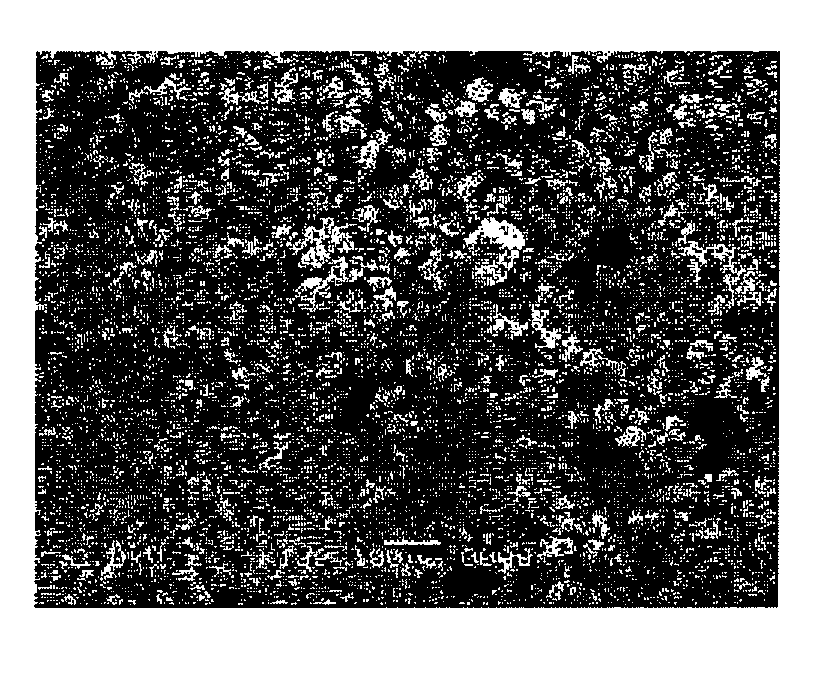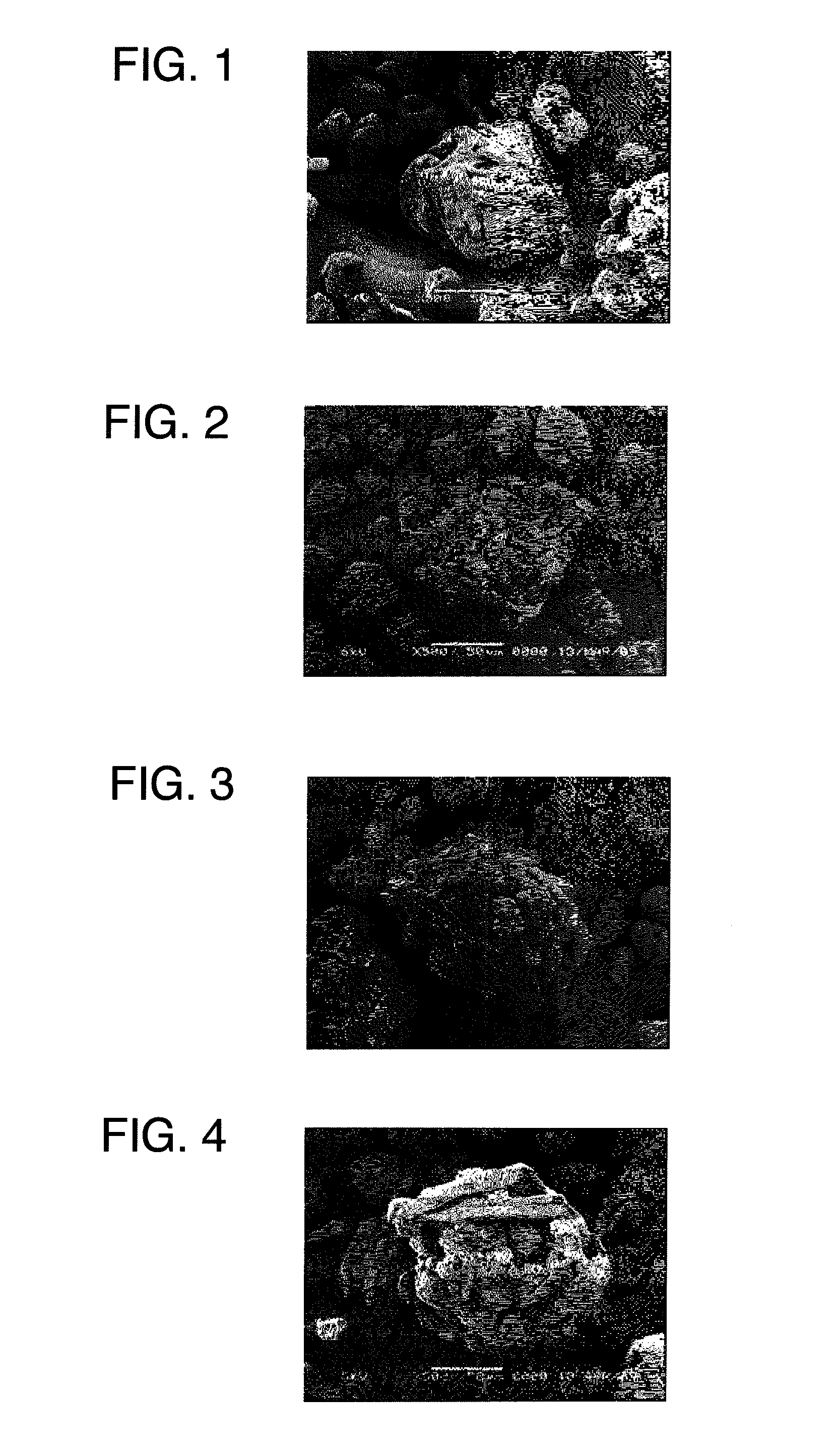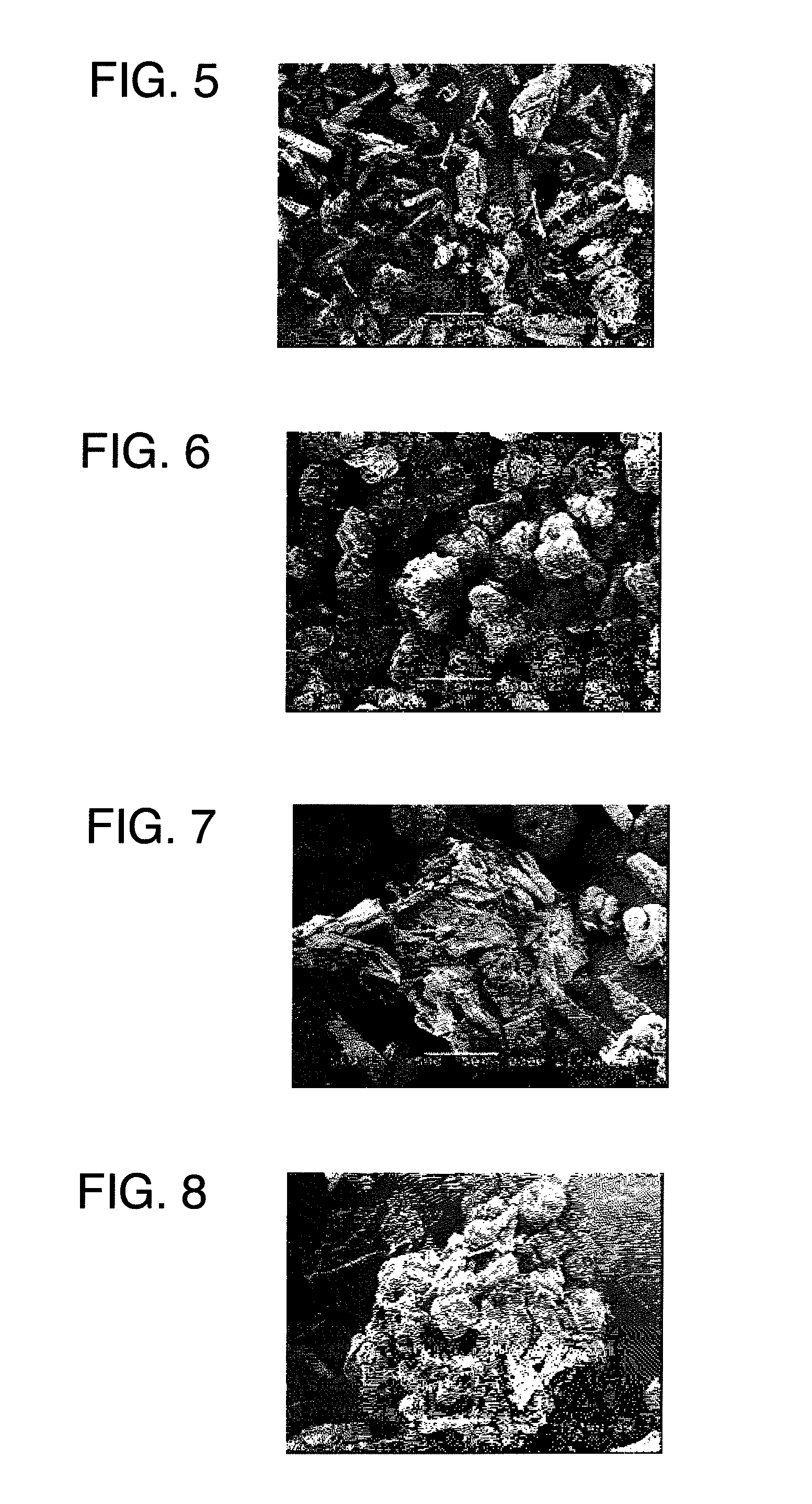Composite particles which contain both cellulose and inorganic compound
a technology of inorganic compound and compound, which is applied in the field of compound particles, can solve the problems of inorganic compound scattering and limit the amount of active ingredient powdered, and achieve the effects of reducing scattering properties, reducing the retention rate of tocopherol acetate, and increasing the apparent specific volume and pore volum
- Summary
- Abstract
- Description
- Claims
- Application Information
AI Technical Summary
Benefits of technology
Problems solved by technology
Method used
Image
Examples
example 1
[0169]A broad leaf tree was subjected to known pulping and bleaching treatments to obtain a pulp (the average width of the cellulose primary particle was approximately 19 μm, and the average thickness of the cellulose primary particle was approximately 3 μm). 4.5 kg of the chipped pulp and 30 L of a 0.2% hydrochloric acid aqueous solution were put into a low speed stirrer (made by Ikebukuro Horo Kogyo Co., Ltd., trade name, 30LGL reactor). While the chipped pulp and the aqueous solution were stirred, hydrolysis was performed at 124° C. for 1 hour to obtain an acid insoluble residue (hereinafter, referred to as a Wet cake). The volume average particle size of the cellulose particle was measured by a laser diffraction / scattering particle size distribution analyzer (made by HORIBA, Ltd., trade name “LA-910”) at a refractive index of 1.20. The obtained volume average particle size was 25 μm.
[0170]Pure water was introduced into a plastic bucket. While pure water was stirred by a 3-1 moto...
examples 2 and 3
[0171]A broad leaf tree was subjected to known pulping treatment and bleaching treatments to obtain a pulp (the average width of the cellulose primary particle was approximately 19 μm, and the average thickness of the cellulose primary particle was approximately 3 μm). 4.5 kg of the chipped pulp and 30 L of a 0.2% hydrochloric acid aqueous solution were put into a low speed stirrer (made by Ikebukuro Horo Kogyo Co., Ltd., trade name, 30LGL reactor). While the chipped pulp and the aqueous solution were stirred, hydrolysis was performed at 124° C. for 1 hour to obtain an acid insoluble residue (hereinafter, referred to as a Wet cake). The volume average particle size of the cellulose particle was measured by a laser diffraction / scattering particle size distribution analyzer (made by HORIBA, Ltd., trade name “LA-910”) at a refractive index of 1.20. The obtained volume average particle size was 25 μm.
[0172]Pure water was introduced into a plastic bucket. While pure water was stirred by ...
examples 4 and 5
[0173]A broad leaf tree was subjected to known pulping and bleaching treatments to obtain a pulp (the average width of the cellulose primary particle was approximately 19 μm, and the average thickness of the cellulose primary particle was approximately 3 μm). 4.5 kg of the chipped pulp and 30 L of a 0.2% hydrochloric acid aqueous solution were put into a low speed stirrer (made by Ikebukuro Horo Kogyo Co., Ltd., trade name, 30LGL reactor). While the chipped pulp and the aqueous solution were stirred, hydrolysis was performed at 124° C. for 1 hour to obtain an acid insoluble residue (hereinafter, referred to as a Wet cake). The volume average particle size of the cellulose particle was measured by a laser diffraction / scattering particle size distribution analyzer (made by HORIBA, Ltd., trade name “LA-910”) at a refractive index of 1.20. The obtained volume average particle size was 25 μm.
[0174]Pure water was introduced into a plastic bucket. While pure water was stirred by a 3-1 moto...
PUM
| Property | Measurement | Unit |
|---|---|---|
| thickness | aaaaa | aaaaa |
| width | aaaaa | aaaaa |
| width | aaaaa | aaaaa |
Abstract
Description
Claims
Application Information
 Login to View More
Login to View More - R&D
- Intellectual Property
- Life Sciences
- Materials
- Tech Scout
- Unparalleled Data Quality
- Higher Quality Content
- 60% Fewer Hallucinations
Browse by: Latest US Patents, China's latest patents, Technical Efficacy Thesaurus, Application Domain, Technology Topic, Popular Technical Reports.
© 2025 PatSnap. All rights reserved.Legal|Privacy policy|Modern Slavery Act Transparency Statement|Sitemap|About US| Contact US: help@patsnap.com



